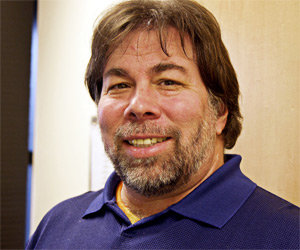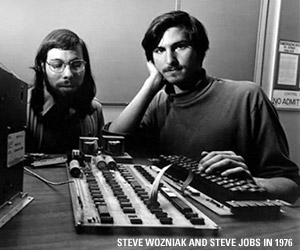What the other Steve has to say...
Apple co-founder Steve Wozniak talks to LAPTOP about Leopard, the iPhone, and the future of computing.
It's been more than three decades since Steve Wozniak and Steve Jobs formed Apple Computer, where "the Woz" brought the Apple I and II to life, and where he played a critical role in bringing the original Macintosh to market. He's considered one of the most influential people in the history of personal computing, and his passion for producing easy-to-use software is still very much a part of Apple's DNA. On the eve of the Leopard launch, we asked Wozniak whether Apple was staying true to its roots and what innovations he'd like to see become a reality.

Steve Wozniak, 2007
LAPTOP: How are you keeping busy these days?
Steve Wozniak: I've been doing various levels of volunteer work on local nonprofit boards. I also do regular speaking engagements around the world about my experience. I started a financial type company with a couple Apple executives, and we acquired a chip maker in Southern California. And we are called Jazz Technologies. At this point I haven't taken a role yet and am trying to figure out what part I will play.
L: Will you be switching to Leopard? Have you tried Vista?
Woz: Yes, I will [switch to Leopard], the first day it comes out. I really don't know anything about it; I like to be surprised when I first play around with it. No, I haven't tried Vista. I bought Parallels, but I didn't install it. I don't have any desire to try out Vista and haven't seen the need to yet.
L: You were recently quoted as saying that a lot of the intuitiveness had gone away from Apple's programs. Do you think Leopard might change that?
Woz: Early on with the first Apples, we had these dreams that the computer would let you know what you wanted to do. The idea was that little icons or words would suggest what you wanted to do, but now I have to find my way around to odd little icons that aren't positioned in the prominent places. When conducting a common task, I have to go searching around in folders or the bottom of the screen. I don't think any of it will be solved with Leopard because I don't think there is incentive to. They want to make things easy, and if it seems easy and it can be demonstrated quickly then it's okay. The real dreams of how it will work for someone who knows nothing about the computer have been lost and don't get addressed anymore.
L: What about the aesthetic appeal of the OS?
Woz: I don't think it makes it easier or harder. I think it's just more fun.
L: Do you think Linux has a lot of potential?
Woz: I don't think it's going to make a big mark. The masses of users aren't going to be going that way. You have to be in a geeky crowd to take advantage of that. You have to be an expert, and not everyone is an expert. In my mind, it's very idealistic people, but most people want to take it easy.
L: Mac's notebook market share has climbed as high as 8.8 percent in the U.S. How much higher do you think it can go?
Woz: I think Macintosh has a lot higher market share than it's ever credited for. I think normal people who buy and use computers on their own choose Macs. It's close to a 50/50 split in my mind. It's businesses that are buying thousands of Microsoft PCs, and there are tons of countries where Apple isn't sold at all.
L: Do you think Leopard will provide a boost?
Woz: I don't think any operating system, despite all its promises, is what sells a computer nowadays. I think OS changes are just done to keep your loyal people happy. Learning an entirely new operating system is something no one wants to do. You get stuck on a platform, and you don't want to start learning a whole new computer system.

L: Now that the browser itself is a computing platform, do you think operating systems are starting to become less relevant?
Woz: I think that's exactly where we are headed, if not already there. Even Apple is looking forward to where computers are, after the operating system isn't important. Apple has already taken its way into the living room and entertainment system. They have a huge advantage in this space. They have the OS, the hardware, the applications, and the online services, and they get them to all work together. A company like Hewlett-Packard, on the other hand, can make a computer and have great ideas, but it boils down to the software element, and they're restricted by what Microsoft provides as an operating system.
L: Does innovation mean the same thing today as it did ten years ago?
Woz: A long time ago when we started Apple, there was an incredible focus on the single person. Without anyone helping them, one person could have the skills and how-to to manage the technical details and the design. There were a lot of build-it-yourselfers. And that led to a lot of innovation. But today in all things electronics and technology, everything is so complicated, and there are various levels of expertise. Innovation changed in that sense. I think innovation occurs in lots of other areas now. The Internet brought about a whole new round of innovation for applications and Web sites. Ten years ago, who could have said what the Internet could have spurred on in terms of innovation?
L: What about hardware?
Woz: As for hardware innovation, these days the market is so big and there is so much money in it that it's usually the purview of people with big money, and very few of them take big risks and do something very new and different. Apple is one of the exceptions. It really comes down to packaging technologies with hardware now. For instance, you can buy little camera media cards. What people don't realize is that a 4GB card has four chips linked together. Take the iPhone: How can you get something as thin as a credit card with so much functionality?
L: Is there anything you would change about the iPhone?
Woz: I think it could be more like a computer. It should be open like a computer. Anyone should be able to develop their own games and programs on it. And keep the phone and the phone services off guard so it's protected.
L: So you're in favor of the unlocking and jailbreaking for third-party applications?
Woz: From a business point of view, Apple owns what they have done. They have a right to lock it. But I am really for the unlockers, the rebels trying to make it free. I'd really like it to be open to new applications. I'd like to install some nice games. Why in the world can I not install a ringtone that I've made? How would that hurt AT&T's network? Here is Steve Jobs sending letters to the record companies saying [they] should provide music that's unprotected, but here he is taking the opposite approach with the iPhone. I don't know to what extent AT&T is involved in the thinking and direction.
L: Does carrying one phone cut it for you?
Woz: I really like to be a technology buff and offer advice to people on devices and be in the know. I'm enamored with different features in different phones. For some of the phones it's the style that I like, for example, Bang & Olufsen's device. The iPhone is just a "got to have" because everyone knows what it is. I like my little BlackBerry Pearl because I like the size for what it does. It's a creditable smart phone but not very pleasing for Internet surfing. I like my RAZR because it has better voice quality than the iPhone; it's a bit louder. Someday I will switch to the iPhone for voice.
L: Beyond touch, how would you like to see user interfaces evolve?
Woz: I don't think anything revolutionary is close on the horizon, but I guess you never know. I didn't think the iPhone would be as pleasing. I was really surprised. Eventually, I would love a little computer with a camera that recognizes me, and I can throw a lot of little gestures at it, and it responds to what I say and do. It will be very hard to create a computer that can understand our voice and our rhythm.
![]()